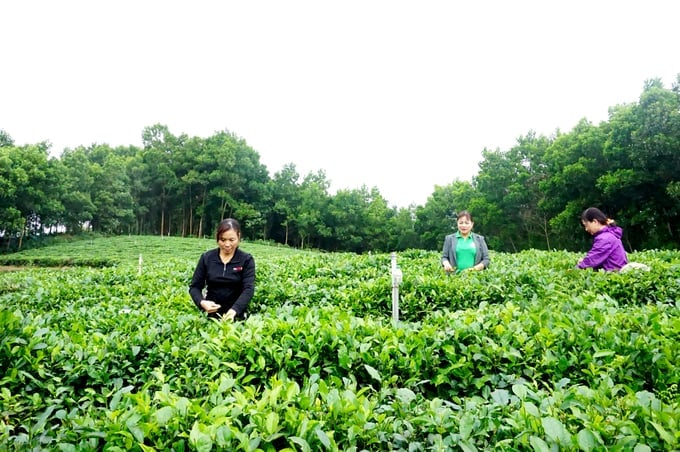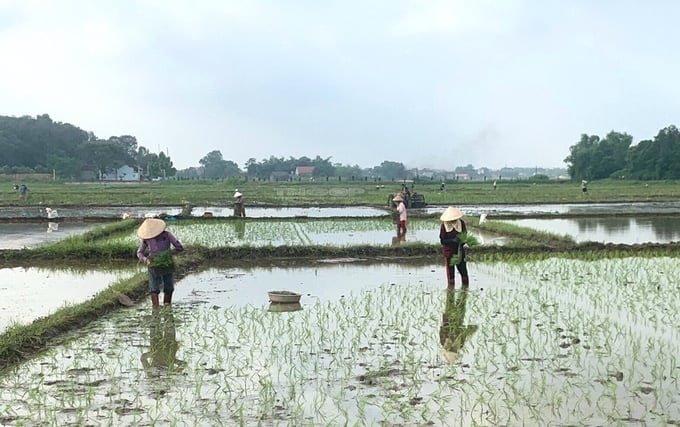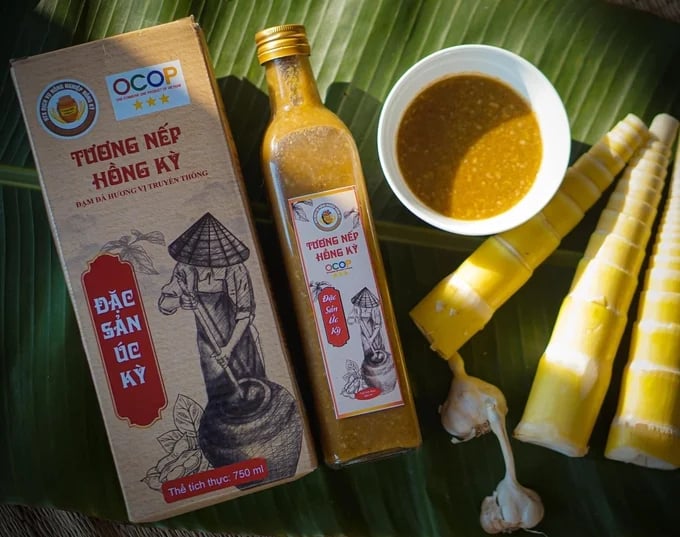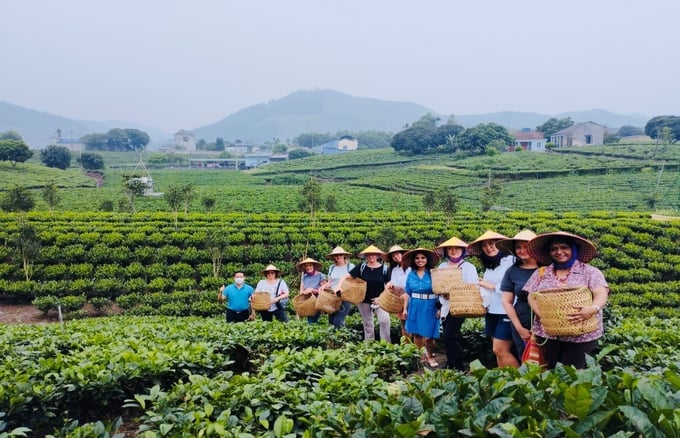November 23, 2025 | 20:23 GMT +7
November 23, 2025 | 20:23 GMT +7
Hotline: 0913.378.918
November 23, 2025 | 20:23 GMT +7
Hotline: 0913.378.918

Developing Production Unit codes helps people improve production efficiency.
Aiming towards the goal of sustainable agricultural development, in recent times, Phu Binh district, Thai Nguyen province, has actively guided and supported farmers and agricultural cooperatives in building Production Unit codes. This solution not only helps farmers improve production efficiency but also contributes to expanding consumption markets for local agricultural products.
Accordingly, Phu Binh District People's Committee has identified key agricultural products to plan and develop high-quality agricultural production areas, consequently, forming a number of concentrated and prominent production areas such as the Thau Dau sticky rice production area in the communes of Uc Ky, Xuan Phuong, Bao Ly, Nha Long, Nga My; J02 rice production area in Tan Duc, Luong Phu, Duong Thanh, Thanh Ninh communes; vegetable production areas in Nha Long, Luong Phu, Tan Duc, Duong Thanh, Thanh Ninh communes...
Since 2022, Phu Binh District People's Committee has allocated over VND 700 million to implement production linkage models associated with rice product consumption in many cooperatives in communes: Tan Khanh, Duong Thanh, Thanh Ninh, Thuong Dinh, Ha Chau, Tan Duc, Luong Phu, Uc Ky, Xuan Phuong.

Production linkage model associated with rice product consumption in Duong Thanh commune, Phu Binh district, Thai Nguyen province.
Households participating in the model are supported with price incentives for fertilizer supplies, biological plant protection drugs, packaging, product labels, and installation of production area signs on concentrated fields. Besides supporting production materials, specialized agencies also pay special attention to opening training classes to propagate and guide farmers on agricultural production processes according to VietGAP standards; recommending farmers to use fertilizers and pesticides appropriate to each stage of plant growth, ensuring compliance with regulations and meeting export requirements.
From the above solutions, currently, the whole district has been granted 9 Production Unit codes in the following communes: Tan Duc, Thanh Ninh, Duong Thanh, Luong Phu, Ha Chau, Thuong Dinh, Tan Khanh, Uc Ky, Xuan Phuong, with a total rice area in the planting areas of more than 44 ha. Being granted a Production Unit code has helped farmers standardize crop care and management processes, improve competitiveness and expand consumption markets.

Since the receiving of the Production Unit code, the cooperative's products have improved quality and are able to build a reputation in the market.
With support in developing Production Unit codes, Hong Ky Agricultural Service Cooperative (Uc Ky commune, Phu Binh district, Thai Nguyen province) has linked and mobilized 91 households to participate in the rice production process according to VietGAP standards. At the end of 2022, the Plant Protection Department (Ministry of Agriculture and Rural Development) issued a Production Unit code for the cooperative's rice products with an area of more than 9.8 ha.
According to Mr Duong Van Duy, Director of Hong Ky Agricultural Service Cooperative, previously, the cooperative's Thau Dau sticky rice and sticky soy sauce products were very difficult to compete within the market, mainly serving only retail with consumption in a few clean agricultural product stores in the province.
“But since the receipt of the Production Unit code, our product quality has been proven, creating trust with consumers. Thanks to that, up to now the cooperative has a connection to supply products to many large supermarkets in the province", Mr. Duy shared.
Tien Yen Tea and Community Tourism Cooperative (Tan Cuong commune, Thai Nguyen City) is one of the first units to form Production Unit codes in Thai Nguyen province. Currently, this unit has 2 ha of tea that has been certified with a Production Unit code.
According to Ms Pham Thi Yen, a representative of the cooperative, the biggest benefit of agricultural products being granted a Production Unit code is the improved reputation with customers, consequently, increasing the opportunity to bring products abroad to demanding markets.

Tien Yen Tea and Community Tourism Cooperative has 2 ha of tea that has been certified with a Production Unit code.
Some units are granted Production Unit codes for growing over large areas, such as: Thai Nguyen Agricultural Development Company Limited was granted a Production Unit code for 11.4 ha of tea in Hoang Nong commune (Dai Tu) and 3.5 ha of tea in Phuc Triu commune (Thai Nguyen city); Sao Thinh Tea Cooperative (Dong Hy) for 9 ha; Khe Coc Tea Cooperative, Tuc Tranh commune (Phu Luong) for 40 ha; Tam Tra Thai Cooperative and Thuy Thuat Tea Cooperative (Thai Nguyen City) were each granted code for over 8 ha...
Tea areas have been assigned Production Unit codes and located on the GPS global system for tracking and traceability. Consequently, it helps to raise awareness of tea producers and processors in ensuring food safety and hygiene and protecting consumer rights. This is also a necessary condition for Thai Nguyen tea products to reach demanding markets around the world.
Translated by Hoang Duy

(VAN) The information was shared at the seminar 'Urban Agriculture - Solutions for Developing Green Spaces,' organized by the Kinh te & Do thi Newspaper and the Biotechnology Center of Ho Chi Minh City.
/2025/11/19/4141-2-132831_216.jpg)
(VAN) One of Japfa's outstanding solutions is implementing digital transformation and artificial intelligence (AI) to optimize operations, enhance productivity, and advance sustainable development.
/2025/11/19/4847-1-093540_448.jpg)
(VAN) The Gia Lai Provincial People’s Committee had a working session with the delegation of the U.S. Department of Agriculture, the State of Idaho, and representatives of the State's leading enterprises.

(VAN) Ca Mau has a sufficient foundation to become a strong regional aquaculture center, where production integrates the economy, the environment, and the lives of the people.

(VAN) SEIKI Group envisions itself as a pioneer in the ‘dual transformation’ of digital technology and green industry, standing alongside the Government and Vietnamese businesses in their pursuit of sustainable development.

(VAN) The VNGEONET network affirms Viet Nam's progress in mastering digital space, providing a precise positioning data platform to serve socioeconomic development.
/2025/11/14/3247-1-184556_35.jpg)
(VAN) Thai Nguyen is methodically implementing digital transformation in the livestock sector, laying the foundation for a modern, transparent, and sustainable agriculture.